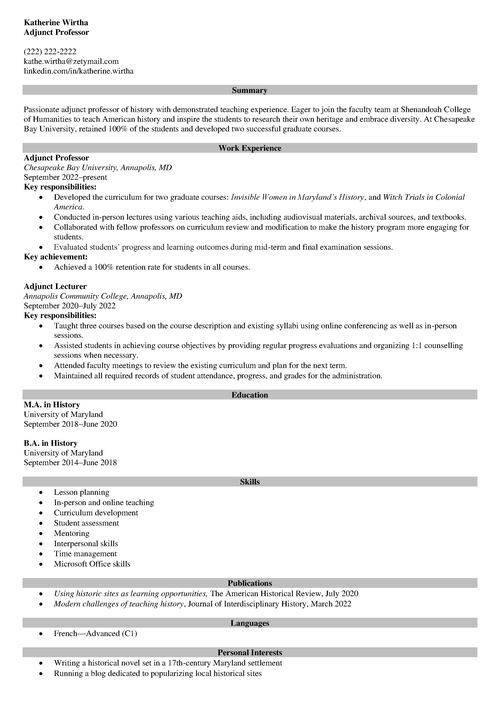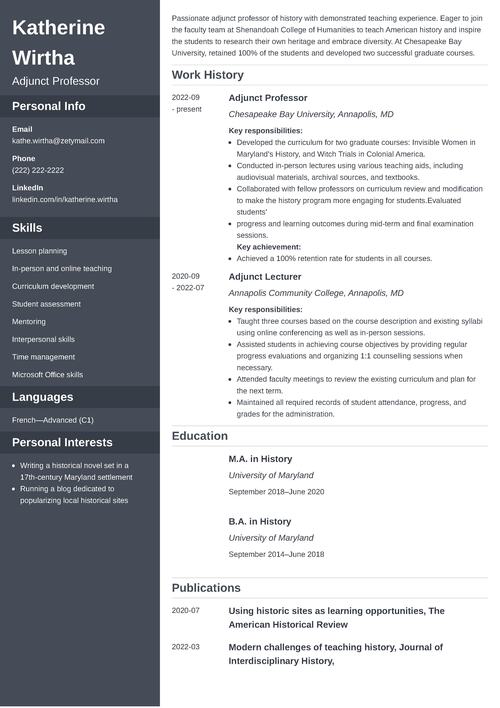Adjunct Professor Resume: Sample & Writing Guide 2025
Create Your Resume NowFinding a great job in higher education is the dream. But to achieve it, you need to prove you’re the best person to fill that vacancy. The stakes are high: while some universities offer adjunct faculty top benefits and generous pay, other institutions treat lecturers like spare parts.
So, prove your worth, and do it now. Write an adjunct professor resume that deserves the Clark Kerr Award.
This guide will show you:
- A sample adjunct professor resume better than 9 out of 10 other resumes out there.
- How to write a resume for adjunct professor jobs quickly and easily.
- Which hard and soft skills matter the most on an adjunct professor resume.
- How to highlight your strengths on an adjunct faculty resume.
Want to save time and have your resume ready in 5 minutes? Try our resume builder. It’s fast and easy to use. Plus, you’ll get ready-made content to add with one click. See 20+ resume templates and create your resume here.
Sample resume made with our builder—See more resume examples here.
Targeting other academic or teaching positions? Check the samples below:
- Professor Resume Example
- Professor CV Example
- Academic CV Example
- Education Resume Example
- PhD Resume Example
- Teacher Resume Example
- New Teacher Resume Example
You may also check our collection of 500+ resume and CV examples for various professions.
Now, let’s see a marvelous sample adjunct professor resume:
Adjunct Professor Resume Sample
Katherine Wirtha
Adjunct Professor
(222) 222-2222
kathe.wirtha@zetymail.com
linkedin.com/in/katherine.wirtha
Summary
Passionate adjunct professor of history with demonstrated teaching experience. Eager to join the faculty team at Shenandoah College of Humanities to teach American history and inspire the students to research their own heritage and embrace diversity. At Chesapeake Bay University, retained 100% of the students and developed two successful graduate courses.
Work Experience
Adjunct Professor
Chesapeake Bay University, Annapolis, MD
September 2022–present
Key responsibilities:
- Developed the curriculum for two graduate courses: Invisible Women in Maryland’s History, and Witch Trials in Colonial America.
- Conducted in-person lectures using various teaching aids, including audiovisual materials, archival sources, and textbooks.
- Collaborated with fellow professors on curriculum review and modification to make the history program more engaging for students.
- Evaluated students’ progress and learning outcomes during mid-term and final examination sessions.
Key achievement:
- Achieved a 100% student retention rate in all courses.
Adjunct Lecturer
Annapolis Community College, Annapolis, MD
September 2020–July 2022
Key responsibilities:
- Taught three courses based on the course description and existing syllabi using online conferencing as well as in-person sessions.
- Assisted students in achieving course objectives by providing regular progress evaluations and organizing 1:1 counseling sessions when necessary.
- Attended faculty meetings to review the existing curriculum and plan for the next term.
- Maintained all required records of student attendance, progress, and grades for the administration.
Education
M.A. in History
University of Maryland
September 2018–June 2020
B.A. in History
University of Maryland
September 2014–June 2018
Skills
- Lesson planning
- In-person and online teaching
- Curriculum development
- Student assessment
- Mentoring
- Interpersonal skills
- Time management
- Microsoft Office skills
Publications
- Using historical sites as learning opportunities, The American Historical Review, July 2020
- Modern challenges of teaching history, Journal of Interdisciplinary History, March 2022
Languages
- French—Advanced (C1)
Personal Interests
- Writing a historical novel set in a 17th-century Maryland settlement
- Running a blog dedicated to popularizing local historical sites
Such a resume can quickly get the faculty board excited. Read on to learn how to write a resume for adjunct professor positions straight away:
1. Go for the Right Adjunct Professor Resume Format
The world of academia appears mysterious to the general public. There are many jobs out there, and it’s easy to get confused trying to understand the differences between them. First, let’s clarify who an adjunct professor is.
Adjunct professors are faculty members who teach in colleges and universities on a limited-term contract. Adjunct professors aren’t eligible for tenure. To make an excellent resume for adjunct professor jobs, you must highlight your teaching experience and interpersonal skills.
But before you start writing, check what kind of job application documents you need. The job posting definitely mentions it. There are significant differences between a CV and a resume, and in this article, I will explain how to create a resume. If it’s a CV that you need, head here: How to Write a CV.
Ready? Let’s go. A resume for an adjunct professor needs to follow specific guidelines:
- Select the right resume format: most job applicants benefit most from the reverse-chronological resume type.
- Create a resume layout in a word processor: many applicants pick the two-column resume because it can encompass more information.
- Make a resume outline with all the mandatory resume sections, such as header, profile, work experience, education, and skills.
- Pick a clear and legible resume font and set the size to 10–11 pt for paragraphs and 13–14 for headings.
- Set the margins of your resume to 1 inch wide on all sides of the document.
- Keep the length of a resume in check: less than 10 years of relevant experience means a one-page resume is best.
When you’re done writing and editing your resume, save your application in a PDF or DOC format.
If you prefer to save time, pick a ready-made resume template. See more: Best Resume Templates for Any Job Type.
2. Write a Powerful Adjunct Professor Resume Profile
The income of adjunct professors varies wildly. While the majority earns between $25,001 and $50,000 annually, the lucky few get more than $100,000 per year. You could be one of them, too. Don’t settle for less—write a powerful adjunct professor resume and apply for jobs that value your worth. Start your application with an attention-grabbing resume profile to improve your chances.
Your options are:
- A resume summary for an adjunct professor: it’s best for experienced lecturers and faculty members. A great resume summary highlights relevant achievements.
- A resume objective: perfect for an adjunct professor with no teaching experience. Use it to highlight your skills and knowledge.
Think of your resume profile as a short advertisement presenting your best qualities. It will be easier to create it if you postpone it till the end of the process. Then, you can simply combine the best parts of your adjunct professor resume into a neat elevator pitch.
Pro Tip: If you’re applying for multiple jobs, remember to create a new profile each time. Don’t go for a generic introduction. Your resume profile must answer why you’re the best candidate for the specific position, so make it relevant!
3. Highlight Your Work Experience Effectively
You’ve probably seen a few job offers for adjunct professors already. Most adjunct faculty positions expect job applicants to have some relevant experience. This means that your resume must prove you can handle groups of students, no matter if you’ve been a professor for a while, or you can still vividly remember your dorm parties.
Here’s how to make an effective adjunct professor resume’s work experience section:
- Start with the most recent position and follow in the reverse order of jobs.
- List your job title, company or university name, and work period for each entry.
- Add 3–6 bullet points describing your work responsibilities for each job listed.
- Begin each sentence with a resume action word.
- Focus on measurable achievements rather than a boring description of duties.
That’s pretty easy if you’re an experienced educator. But if you’re writing a resume for an adjunct professor with no experience in teaching, that’s a tougher nut to crack. In that case, try to highlight experiences related to tutoring or mentoring. They could come from your extracurricular activities while at university, volunteer work, or non-academic jobs.
Remember that a resume is effective only when it’s tailored to a specific job offer. Learn more: How to Write a Tailored Resume.
4. Make Your Education Shine
There’s no such thing as an uneducated professor. Most faculty jobs have specific requirements regarding the applicant’s education level. A master’s degree is usually the basic requirement, but many institutions expect candidates to have a Ph.D. When writing your resume for adjunct professor positions, make sure that your education info is listed properly.
Here’s how to go about it:
- Make a separate education section on your resume.
- List your highest degree at the top, and add your major.
- Mention the name of the university or college and years of study.
If you’ve got a few years of experience in academic teaching up your sleeve, there’s no need to add more details. However, when writing a resume with no experience, filling that section with additional information can work miracles. You could mention the following:
- Your GPA on a resume: only if it’s truly impressive, so above 3.80
- Academic achievements, such as winning a competition or an award
- Research projects
- Scholarships
- Fraternity or sorority membership
- Making the Dean’s List
- Graduating with honors
- Relevant coursework
- Studying abroad
Remember to pick activities and achievements that can prove you’ll be a good educator. For example, being a teaching assistant is more important than being the president of an arts & crafts club.
Making a resume with our builder is incredibly simple. Follow our step-by-step guide, use ready-made content tailored to your job and have a resume ready in minutes.
When you’re done, Zety’s resume builder will score your resume and our ATS resume checker will tell you exactly how to make it better.
5. Select the Skills That Matter on an Adjunct Professor Resume
Listing skills on a resume isn’t about quantity but all about quality. Don’t stuff your adjunct professor resume with random things—pick only the hard and soft skills that truly reflect your abilities and fit the role perfectly.
Follow these steps to make a great list of skills for your resume:
- Make a list of all professional skills you’ve mastered, including soft skills, hard skills, and technical skills.
- Take a look at the job advertisement and identify the skills required for this position.
- Compare your skill set against the job posting.
- Select 6–10 skills that match.
Need some inspiration? Here’s a list of common adjunct faculty skills:
Sample Adjunct Professor Resume Skills:
- Lesson planning
- In-person and online teaching
- Curriculum development
- Student assessment
- Giving and receiving feedback
- Mentoring
- Teaching materials
- Presentation skills
- Verbal and written communication
- Interpersonal skills
- Organizational skills
- Time management
- Critical-thinking skills
- Transferable skills
- Teamwork abilities
- Computer skills
- Microsoft Office skills
Here’s another thing: the skill section of a resume isn’t the only place where you can mention your skills. In fact, you should brag about them in other parts of your resume, too. Treat those skills as your resume keywords, and make sure you mention them in your resume profile and work experience sections. This will help to prove they’re not just empty words.
Adding certain words to a resume can boost its powers instantly. Learn more: What Are The Best Power Words for Resumes?
6. Improve Your Adjunct Faculty Resume with Additional Sections
The crucial resume sections are ready. But you don’t want to go for the bare minimum, do you? That won’t cut it on an adjunct professor's resume.
Make your resume stand out by picking additional sections, such as:
- Certifications and licenses
- Foreign language proficiency
- Academic or personal projects
- Conferences
- Memberships and associations
- Publications and writing pieces
- Personal interests
- Volunteer experience
- Research experience
These extra sections are a great way for you to highlight your skills and show that you’re a great fit for the position!
Want to add references, too? Learn how: Does Putting References on a Resume Make Sense?
7. Create a Cover Letter That Complements Your Adjunct Professor Resume
You’re almost ready to send your application to the faculty board. But before you do that, create a new document and type up your adjunct professor's cover letter. Most job postings for academic positions require it.
Here’s a handful of tips on how to write a cover letter:
- Pick a modern cover letter template that matches your adjunct professor's resume.
- Start your cover letter with an attention-grabbing statement.
- Explain how your expertise and skillset are exactly what this university needs.
- End the cover letter with a call to action that convinces them to reply.
When you finish, send that job application straight away.
Plus, a great cover letter that matches your resume will give you an advantage over other candidates. You can write it in our cover letter builder here. Here's what it may look like:
See more cover letter templates and start writing.
That’s all you must know about writing an adjunct professor resume. It wasn’t that difficult, right?
Got any tips to share with other adjunct faculty candidates? Need some clarification on any steps outlined in this guide? Let us know in the comments below!
About Zety’s Editorial Process
This article has been reviewed by our editorial team to make sure it follows Zety's editorial guidelines. We’re committed to sharing our expertise and giving you trustworthy career advice tailored to your needs. High-quality content is what brings over 40 million readers to our site every year. But we don't stop there. Our team conducts original research to understand the job market better, and we pride ourselves on being quoted by top universities and prime media outlets from around the world.




